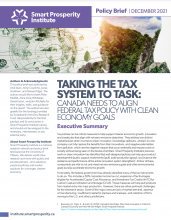Tax policies can be critical measures to help support cleaner economic growth, innovation and create jobs that align with net-zero emissions objectives. They address two distinct market failures when it comes to clean innovation: knowledge spillovers, wherein no one company can fully capture the benefits from their innovations, and negative externalities from pollution, which are the negative impacts that occur externally and impose costs on society without being seen on the books of emitters. Smart Prosperity Institute’s previous work on clean innovation has identified that well-designed policies can help spur product development (push), support market entry (pull), scale production (grow), and improve the resilience and performance of the entire innovation system (strengthen). All four of these components are vital to not only meet net-zero emissions goals and other environmental goals but also accelerate economic growth.
Fortunately, the federal government has already identified many of the tax instruments to do so. This includes a 50% corporate income tax cut, expansion of technologies eligible for Accelerated Capital Cost Allowance, and Investment Tax Credits (ImTC) for Carbon Capture Utilization and Storage (CCUS). These measures will help pull products from market entry into mass production. However, there are other pertinent challenges for the cleantech sector. Some of the major ones are lack of market demand, absence of manufacturing, insufficient capital for startups and scaleups, and retention of firms moving to the U.S. and other jurisdictions.
Some of these problems can be addressed immediately by providing greater clarity on existing tax measures and implementing new ones. However, other issues require deeper analysis of the cleantech ecosystem and equity effects of tax measures.
Smart Prosperity Institute’s recommendations for immediate action by the federal government are as follows:
- Provide greater clarity on pledged initiatives such as ImTCs rolled out in Budget 2021 to support CCUS and green hydrogen. Ongoing consultations for CCUS need to be completed and stakeholder consultations for green hydrogen tax incentives need to start;
- Improve competitiveness by eliminating import tariffs on intermediate inputs used by Canadian cleantech manufacturers to reduce compliance costs and regulatory burdens;
- Identify bottlenecks to innovation and growth, by defining the scope of analysis for tax study mentioned in Budget 2021. The study should be supplemented by a comprehensive review of the Canadian cleantech sector; and
- Increase equity and inclusion in the cleantech sector, by launching a comprehensive Equity Diversity Inclusion (EDI) review of existing cleantech tax instruments and policies.



